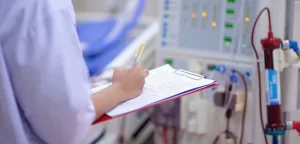+90 533 813 89 77
info@bookingforhealth.com

Dialysis and Kidney Transplant
Kidney Transplant in Turkey: A Cost-Effective and High-Quality Option for Foreign Patients
Kidney failure can be a debilitating condition, but there are two primary treatment options available: dialysis and kidney transplantation. Dialysis is a medical procedure that artificially filters waste products and excess fluids from the blood, but it can be expensive and time-consuming. Kidney transplantation, on the other hand, offers a more permanent solution.
Turkey has emerged as a popular destination for kidney transplantation, particularly for foreign patients seeking cost-effective and high-quality medical care. The country boasts world-class medical facilities and experienced transplant surgeons.
The cost of a kidney transplant in Turkey is relatively lower compared to many other countries, making it an attractive option for international patients. Despite its affordability, the quality of medical care remains uncompromised.
The kidney transplant procedure in Istanbul involves replacing a diseased kidney with a healthy one from either a living or deceased donor. The procedure is typically performed laparoscopically, which means that there are smaller incisions and a shorter recovery time.
Following a successful kidney transplant, proper post-operative care and nutrition play a crucial role in ensuring a smooth recovery. Patients must follow their medical team’s guidelines, including taking prescribed medications and adopting a balanced diet to support their new kidney’s health.
In addition to the kidney transplant itself, patients may undergo a renal transplant Doppler, a non-invasive diagnostic test used to assess the blood flow to the transplanted kidney. This test helps monitor the kidney’s health and function post-transplant.
If you are considering a kidney transplant, Turkey is a viable option for foreign patients. The country offers high-quality medical care at a fraction of the cost of other countries. To learn more about kidney transplantation in Turkey, please visit our website or contact us today.
Advantages and Disadvantages of dialysis and kidney transplant
Dialysis and kidney transplant are two primary treatments for kidney failure, each with its own set of advantages and disadvantages.
Advantages of Dialysis:
- Immediate Treatment: Dialysis can quickly address the buildup of waste and fluid in the body, providing immediate relief.
- Accessibility: Dialysis is widely available and can be performed in various settings, including hospitals, clinics, or even at home.
- Less Invasive: Dialysis is a non-surgical procedure that does not require major surgery.
Disadvantages of Dialysis:
- Lifestyle Impact: Dialysis is a time-consuming process that can affect a patient’s daily life, limiting activities and requiring a strict schedule.
- Dependency: Patients often become dependent on regular dialysis sessions, which may continue for the rest of their lives.
- Potential Complications: Dialysis can lead to complications such as infections, anemia, and changes in blood pressure.
Advantages of Kidney Transplant:
- Permanent Solution: A successful kidney transplant offers a more permanent solution to kidney failure, eliminating the need for ongoing dialysis.
- Improved Quality of Life: Transplant recipients often experience better energy levels and an improved quality of life compared to those on long-term dialysis.
- Reduced Dietary Restrictions: Transplant recipients may have fewer dietary restrictions compared to dialysis patients.
Disadvantages of Kidney Transplant:
- Surgical Risks: The transplant surgery involves inherent risks, including infection, bleeding, and potential organ rejection.
- Limited Availability: Organ shortages can lead to long waiting times for a suitable donor kidney.
- Immunosuppression: Transplant recipients need to take immunosuppressive drugs to prevent rejection, which can have side effects and may increase the risk of infections.
In conclusion, the choice between dialysis and kidney transplant depends on individual factors, including health status, lifestyle, and the availability of a suitable donor. While dialysis provides immediate relief, a kidney transplant offers a more sustainable solution with improved long-term outcomes. The decision should be made in consultation with healthcare professionals based on the patient’s unique circumstances.



